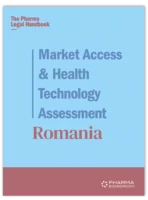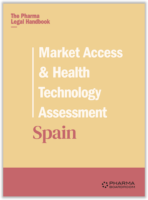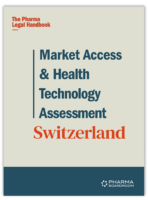Cannabinoid Drugs, Medicinal Cannabis and Opioid Drugs
PRK Partners / Czech Republic
Cannabinoid drugs, medicinal cannabis and opioid drugs in Czech Republic – a legal guide. Prepared in association with PRK Partners, a leading law firm in Czech Republic, this is an extract from The Pharma Legal Handbook: Czech Republic, available to purchase here for GBP 119.
CANNABINOID DRUGS
1. Are Cannabinoid Drugs authorized in your country?
Cannabinoid Drugs, i.e., drugs containing active compounds of cannabis, such as tetrahydrocannabinol (THC) or cannabidiol (CBD), can be authorized in the Czech Republic under the general legal framework for authorization of drugs. Cannabinoid Drugs must be differentiated from Medicinal Cannabis (dried flowers of the plant Cannabis sativa L. or Cannabis indica L. intended for medicinal purposes), which is subject to a specific legal framework.
2. What are the regulatory authorities with jurisdiction over Cannabinoid Drugs?
The regulatory authorities with jurisdiction over all drugs, i.e., Cannabinoid Drugs as well as other drugs, are the State Institute for Drug Control and the Ministry of Health.
3. Is there a specific regulatory framework for the authorization, pricing, and reimbursement of Cannabinoid Drugs?
No. Authorization, pricing and reimbursement of Cannabinoid Drugs are regulated by the same legislation as the authorization, pricing and reimbursement of other drugs (please refer to Answer No. 2 of Regulatory, Pricing, and Reimbursement Overview).
4. Which are the cannabinoid drugs that have received market approval to date?
The only drug containing cannabinoids which has been authorized in the Czech Republic so far is Sativex (registration No. 63/ 256/11-C, marketing authorization holder: GW Pharma (International) B.V., the Netherlands, type of registration procedure: mutual recognition procedure).
Sativex contains THC and CBD; every 100 microliters of spray contain 2.7 milligrams of tetrahydrocannabinol (THC) and 2.5 milligrams of cannabidiol (CBD). Sativex is used in the treatment of multiple sclerosis, specifically to treat symptoms related to muscular stiffness (spasticity). Sativex can be prescribed only after other drugs for muscular stiffness proved ineffective.
5. Who can prescribe Cannabinoid Drugs?
Drugs containing cannabinoids (such as Sativex) can be prescribed by any medical doctor authorized to provide healthcare services; although a specific type of prescription is required.
6. Is there a list of doctors authorized to prescribe Cannabinoid Drugs?
No, there is no such list.
7. What approvals or notifications are required to prescribe Cannabinoid Drugs?
Cannabinoid Drugs containing substances classified as narcotic substances (such as Sativex that contains THC) can only be prescribed using the electronic prescription system (eRecept), whereas the electronic prescription must bear a specific label “highly addictive substance”.
Under exceptional circumstances, a specific type of prescription in paper form with a diagonal blue stripe may be used. However, the distribution, use, and disposal of paper prescriptions with a diagonal blue stripe is strictly regulated.
8. Which organizations are authorized to sell/distribute Cannabinoid Drugs available?
Drug manufacturers, wholesalers and distributors wishing to sell/distribute authorized Cannabinoid Drugs must obtain the following authorizations: (i) authorization from the Ministry of Health for handling narcotic and psychotropic substances under the Narcotic Substances Act and (ii) authorization from the State Institute for Drug Control for manufacturing and/or distributing drugs under the Act on Drugs.
As regards selling Cannabinoid Drugs to the public, the only organizations authorized to do so are pharmacies, upon a prescription issued by a medical doctor. For details regarding prescriptions, please refer to Answer No. 7 of this Chapter.
9. Is there a list of retailers/ distributors authorized to sell Cannabinoid Drugs?
A database of pharmacies is available at the State Institute for Drug Control’s website at the following link: https://prehledy.sukl.cz/prehledy.html#/lekarny
Any pharmacy in the database is authorized to sell (dispense) Cannabinoid Drugs upon presentation of a proper prescription issued by a medical doctor. Pharmacies do not need any special permission to sell Cannabinoid Drugs since they are exempt from the requirement to hold an authorization for handling narcotic and psychotropic substances issued by the Ministry of Health under the Narcotic Substances Act.
A database of distributors is available at the State Institute for Drug Control’s website at the following link: https://www.sukl.eu/modules/distributors/index.php?lang=2
However, there is no information about whether the distributor is authorized to distribute Cannabinoid Drugs in this database, i.e. whether it holds an authorization for handling narcotic and psychotropic substances issued by the Ministry of Health under the Narcotic Substances Act.
10. Are there proposals for reform or significant change to the regulation of Cannabinoid Drugs?
There are no proposals for any significant reform of Cannabinoid Drug regulation.
11. When are they likely to come into force?
Not applicable.
MEDICINAL CANNABIS
12. Is Medicinal Cannabis authorized in the country?
Yes, Medicinal Cannabis has been authorized in the Czech Republic since 2013, but in practice it has only been available to patients since 2015.
13. What are the regulatory authorities with jurisdiction over Medicinal Cannabis?
Medicinal Cannabis falls under the jurisdiction of the State Agency for Medical Cannabis (SAKL) and the Ministry of Health.
Technically, SAKL is only a subdivision of the State Institute for Drug Control as one of the tasks of the State Institute for Drug Control is to serve as an agency pursuant to the Single Convention on Narcotic Drugs (1961).
14. What is the regulatory framework for the authorization, pricing, and reimbursement of Medicinal Cannabis?
Medicinal Cannabis is defined as dried flowers of the plant Cannabis sativa L. or Cannabis indica L. intended for medicinal purposes.
Medicinal Cannabis can only be prescribed by medical doctors with the appropriate specialization and only for the health indications listed in the Cannabis Decree (No. 236/2015 Coll.). This applies to both locally produced and imported Medicinal Cannabis.
Medicinal Cannabis is dispensed in a form of an individually prepared medicinal product (IPMP), i.e., a medicinal product that is individually prepared for a patient by a pharmacy based on a medical doctor’s prescription. Only Medicinal Cannabis whose levels of THC (tetrahydrocannabinol) fall within 0.3 percent to 25.0 percent and whose levels of CBD (cannabidiol) do not exceed 23.0 percent can be used to prepare an IPMP.
Both locally produced and imported Medicinal Cannabis is available. Following a recent change in the regulation effective from 1 January 2022, a licensing system for producers was introduced in order to facilitate access to locally grown Medicinal Cannabis (please refer to Answer No. 16 of this Chapter 8: Medicinal Cannabis).
Medicinal Cannabis finally became reimbursable on 1 January 2020. Public health insurance currently covers 90% of the price of up to 30 grams of Medicinal Cannabis per month per patient. If approved by the insurance company, this amount can be increased to 180 grams per month per patient.
To be precise, reimbursement covers 90% of the price of the IPMP. The maximum possible price of all IPMPs (whether reimbursed or not) is set in a price regulation issued by the Ministry of Health. The maximum price varies based on the amounts of Medicinal Cannabis used and the size of the packaging, but in general it is calculated with a price similar to the price of the locally produced Medicinal Cannabis and the materials and pharmacy labour used.
15. How is the production and import of Medicinal Cannabis regulated and by which agencies/authorities?
Production and import of Medicinal Cannabis is primarily regulated by the Narcotic Substances Act and the Act on Drugs and their implementing regulations, the most relevant of them being the Cannabis Decree (Decree No. 236/2015 Coll.). The authorities responsible for regulation of the import and production of Medicinal Cannabis are the Ministry of Health (its Inspectorate of Narcotic Drugs and Psychotropic Substances), and the State Agency for Medical Cannabis, whose tasks are carried out by the State Institute for Drug Control. Certain powers related to the import of Medicinal Cannabis are vested in the Customs Administration.
16. What approval or notifications are necessary to produce or import Medicinal Cannabis?
Effective 1 January 2022, the previous tender-based single-license and single-producer system was replaced by an application-based licensing system. Any legal entity or entrepreneur who meets the statutory criteria (e.g., has no criminal record) can apply for a cultivation license to grow locally produced Medicinal Cannabis. The statutory criteria may be somewhat restricting as the producer must have a fitted and equipped growing room prior to filing the application for a license. The license may be granted only after a search of the growing room conducted by the State Institute for Drug Control, but not later than within 30 days of filing the application. The search is a paid service billed by the hour at a rate of CZK 900 (approx. EUR 40) per hour. The applicant is obliged to pay a deposit amounting to CZK 26,100 (approx. EUR 1,055) as the price for the services, which is capped at CZK 52,200 (approx. EUR 2,125). The license is valid for 5 years (unless cancelled or revoked) and can be repeatedly renewed. The State Institute for Drug Control must be informed of any changes relating to the license without undue delay; some may even require filing an application for changing the license within 15 days of any change. Additional obligations arise from the license; e.g., the holders must inform the State Institute for Drug Control on the number of cultivated Medicinal Cannabis plants. Furthermore, an authorization for handling narcotic and psychotropic substances issued by the Ministry of Health under the Narcotic Substances Act is required. Failure to obtain an authorization for handling narcotic and psychotropic substances or cancellation of the authorization leads to termination of the cultivation license.
Suppliers intending to import Medicinal Cannabis from abroad are required to obtain (i) an authorization to distribute medicinal products with an extended scope encompassing distribution to persons authorized to prepare medicinal products (i.e. pharmacies), issued by the State Institute for Drug Control under the Act on Drugs and, (ii) an authorization for handling narcotic and psychotropic substances issued by the Ministry of Health under the Narcotic Substances Act. On top of that, the importer has to secure individual import licenses for each individual supply of Medicinal Cannabis, which are also issued by the Ministry of Health. The import licenses are under the discretion of the Ministry of Health, which has no obligation to issue an individual import license, even if all statutory requirements are met.
17. What is the regulatory framework for the marketing and distribution of Medicinal Cannabis?
Advertising Medicinal Cannabis to the general public is expressly prohibited. The law is not clear on the possibility of advertising Medicinal Cannabis to experts (i.e., doctors and pharmacists), with the prevailing view being that it is not permitted due to the fact that only medicinal products and substances that are registered in accordance with the Act on Drugs may be advertised while Medicinal Cannabis is not such a registered medicinal product. Academic/scientific debate is possible. Advertising drugs containing narcotic or psychotropic substances to experts (i.e., doctors and pharmacists) is generally possible provided the advertisement is distributed through communication channels designated for these experts and the information contained in the advertisements is precise, current, and verifiable. Other general rules on advertising medicinal products to experts apply as well. For these, please refer to Answer No. 17 of Chapter: Marketing, Manufacturing, Packaging & Labeling Advertising.
Medicinal Cannabis can be distributed by any legal entity or entrepreneur who meets the statutory criteria. In particular such person must obtain an authorization to distribute medicinal products with an extended scope encompassing distribution to persons authorized to prepare medicinal products, i.e., pharmacies. Medicinal Cannabis can then be sold to patients only by pharmacies as an IPMP.
18. How can patients obtain Medicinal Cannabis?
Medicinal Cannabis can be obtained by patients as an individually prepared medicinal product (IPMP) upon a doctor’s prescription in the maximum quantity of 180 grams per month and only by patients who are at least 18 years old.
Medicinal Cannabis can only be prescribed through an electronic prescription system (eRecept) operated by the State Institute for Drug Control. The electronic prescription system includes a Register of Restricted Medicinal Products. One of the purposes of the register is to provide the prescribing doctor and dispensing pharmacist with a tool to check and ensure the compliance with the relevant statutory criteria with respect to a specific patient.
The electronic prescription for Medicinal Cannabis must, in particular, include a specific code. The code is used to divide the Medicinal Cannabis into individual groups based on its species (indica or sativa) and its THC and CBD content (percentage-based) and can be found in Annex 1 to the Cannabis Decree. Furthermore, the prescription must include the dosage and route of administration of the medicinal product.
19. Who can prescribe Medicinal Cannabis?
Only doctors with a specific specialization may prescribe Medicinal Cannabis, and only for specific health indications according to the doctor’s specialization. Both the allowed specializations and corresponding health indications are listed in Annex 3 of the Cannabis Decree.
For example, doctor specializations include clinical and radiation oncology, rheumatology, neurology, psychiatry, etc. and Medicinal Cannabis can be used as an auxiliary treatment to alleviate symptoms accompanying such indications as chronic constant pain, spasticity and related pain from multiple sclerosis, nausea or vomiting in association with cancer or HIV treatment, Tourette syndrome and surface treatment of dermatoses and mucosal lesions.
20. Is there a list of doctors authorized to prescribe Medicinal Cannabis?
A list of doctors authorized to prescribe Medicinal Cannabis is available at the website of the State Agency for Medical Cannabis: http://www.sakl.cz/en/patients/list-of-prescribing-medical-doctors
However, doctors must give their consent to be included in the list and thus the list does not necessarily include all doctors authorized to prescribe Medicinal Cannabis.
21. What approvals or notifications are required to prescribe Medicinal Cannabis?
In order to prescribe Medicinal Cannabis, the specialist doctor must apply to the State Institute for Drug Control for authorization to prescribe. The application is filed via a simple electronic form and merely the doctor’s specialization is verified without the need to provide any documentation. Based on the application, the doctor is granted an access to the Register of Restricted Medicinal Products and may start prescribing Medicinal Cannabis.
Medicinal Cannabis can only be prescribed by doctors authorized to provide healthcare services within the appropriate specialization and only for the health indications listed in Annex 3 of the Cannabis Decree.
22. Where is Medicinal Cannabis available?
Any pharmacy may dispense Medicinal Cannabis based on a prescription. In practice, however, it is likely not all pharmacies will be able to and have sufficient supplies and types of Medicinal Cannabis in stock to prepare IPMPs for all patients.
23. Is there a list of retailers authorized to sell Medicinal Cannabis?
Any pharmacy may dispense Medicinal Cannabis. A database of pharmacies is available at the State Institute for Drug Control’s website at the following link: https://prehledy.sukl.cz/prehledy.html#/lekarny.
24. Are there proposals for reform or significant change to the regulation of Medicinal Cannabis?
The changes made by the recent amendment to the regulation related to Medicinal Cannabis are not fully implemented yet. In particular, the Ministry of Health is yet to issue or amend accompanying implementing decrees.
One of the significant changes introduced by the recent amendments includes the ability to utilize extracts from Medicinal Cannabis in the preparation of IPMPs. An amendment to the Cannabis Decree is currently in the final stages of the legislative process and should provide details on use of extracts (acceptable methods of manufacture, labelling, storage, etc.). This should further facilitate access to Medicinal Cannabis as pharmacies could source prepared extracts rather than Medicinal Cannabis itself.
The Ministry of Health is also yet to issue a decree on the cultivation and processing of Medicinal Cannabis plants, which should provide detailed information on the specifics of cultivation and processing including rules for secure storage, such as CCTV and other security measures to secure a growing room for Medicinal Cannabis plants. The decree is to be inspired by good agricultural and collection practice (GACP) guidelines issued by the European Medicines Agency’s Committee on Herbal Medicinal Products (HMPC). The new licensing system cannot function properly in practice until this decree has been issued.
OPIOID DRUGS
25. Are Opioid Drugs authorized in your country?
Yes, Opioid Drugs are authorized in the Czech Republic under the general legal framework for authorization of drugs.
26. What are the regulatory authorities with jurisdiction over Opioid Drugs?
The regulatory authorities overseeing drugs, including Opioid Drugs, are the Ministry of Health and the State Institute for Drug Control.
27. Is there a specific regulatory framework for the authorization, pricing, and reimbursement of Opioid Drugs?
No. Authorization, pricing and reimbursement of Opioid Drugs are regulated by the same legislation as the authorization, pricing and reimbursement of other drugs (please refer to Answer No. 2 of Chapter: Regulatory, Pricing, and Reimbursement Overview).
28. Which are the Opioid drugs that have received market approval to date?
According to the State Institute for Drug Control’s drug database there are a number of drugs containing opioids that have received market approval and are available with a doctor’s prescription. For example: Morphine (Sevredol, Morphine Kalceks), Oxycodone (Oxycontin), Hydromorphone (Palladone SR), Fentanyl (Adolor, Dolforin), etc.
29. Who can prescribe Opioid Drugs?
Any medical doctor authorized to provide healthcare services can prescribe Opioid Drugs; although a specific type of prescription may be required. Limitations on prescription may apply for the purposes of reimbursement of the drugs from public health insurance.
30. Is there a list of doctors authorized to prescribe Opioid Drugs?
No, there is no such list.
31. What approvals or notifications are required to prescribe Opioid Drugs?
Opioid Drugs can be prescribed by a medical doctor authorized to provide healthcare services, either with a regular electronic prescription or on an electronic prescription labelled “highly addictive substance” depending on the type of the opioid substance contained in the prescribed medicinal product. Under exceptional circumstances, a paper form prescription or a specific type of prescription in paper form with a diagonal blue stripe may be used.
32. Which organizations are authorized to sell/distribute Opioid Drugs available?
Drug wholesalers and distributors wishing to sell/distribute authorized Opioid Drugs must obtain the following authorisation s: (i) authorisation from the Ministry of Health for handling narcotic and psychotropic substances under the Narcotic Substances Act and (ii) authorization from the State Institute for Drug Control for distribution of drugs under the Act on Drugs.
Drugs containing opioids are dispensed in pharmacies upon a doctor’s prescription (either a regular electronic prescription or upon an electronic prescription labelled “highly addictive substance”, or in exceptional cases on regular paper prescriptions or paper prescriptions with a blue stripe). Any pharmacy may dispense Opioid Drugs. They do not need any special permission to handle opioids since pharmacies are exempt from the requirement for an authorization from the Ministry of Health for handling narcotic and psychotropic substances under the Narcotic Substances Act.
33. Is there a list of retailers/ distributors authorized to sell Opioid Drugs?
There is no special list of pharmacies/distributors that sell Opioid Drugs. Nevertheless, the State Institute for Drug Control provides a general search tool of all pharmacies in the Czech Republic on its website: https://prehledy.sukl.cz/prehledy.html#/lekarny. The State Institute for Drug Control also provides a similar general search tool for distributors: https://www.sukl.eu/modules/distributors/index.php?lang=2.
34. Are there proposals for reform or significant change to the regulation of Opioid Drugs?
There are currently no proposals for reform or change to the regulations of Opioid Drugs.
35. When are they likely to come into force?
Not applicable.



































































